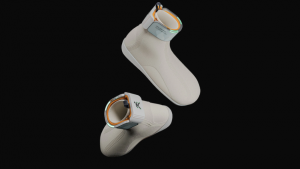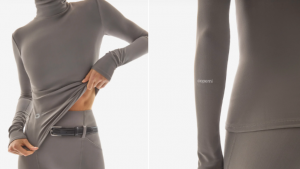From the Series
Today was the press preview day of the 50th Milan Furniture Fair, which we have been previewing for the past few weeks. Ruairi Abrahams, who likes to be known as “video guy”, and I scurried from all over Milan catching openings and previews, including the Campana Brothers’s Klein Karoo project, Alberto Alessi’s shop-under-construction preview of his new showroom and Matali Crasset’s marvellous Dip In Space installation project with students of HEAD in Geneva.
In a brief breather I had a wonderful time at Ventura Lambrate exploring the student exhibitions of the Bezalel Academy of Arts and Design (Jerusalem), the Royal College of Arts (London) and Central St Martins College of Art and Design’s textile Masters students (London).
What really struck me was the way students were using unconventional materials and production methods in unorthodox contexts. The Bezalel students displayed a number of small, self-explanatory but striking projects including Yael Friedman’s cheeky Veggie range of jewellery; Ori Sonnenschein’s Solskin Peals range of tableware made from orange peels; Galit Begas’s Footprints range of shoes made from plastic bags; Nitsan Debbi’s Crusts range of pastry baked home appliances; and Noa Himelfarb’s Muzoo DIY mud doll kit.
The work of textile Masters students of Central St Martins ranges from the poetic, such as Wei Chen’s paper flower installations that fall with the rain and release seeds into the neglected corners of the urban landscape, to abstract explorations of the bio- and nanotechnology applications in textiles by the likes of Natsai Chieza, Amy Congdon and Priyanka Gaitonde.
These fabrics are a far cry from polyester or even cotton socks with one student, Miriam Ribul, even exploring how to make air tangible through textiles. A less abstract but no less worthy project also came from Hao-Ni Tsai who explored the possibility of transforming indigenous Taiwanese fibres into innovative textiles through hybrid combinations.
Begging the very process of design, Royal College of Arts student Jorge Manes set up a temporary moving factory along the famous Spanish pilgrim route, El Camino. Called Ultreia, the project entailed Manes travelling on a bicycle with a tent and solar sheet for two weeks. The bicycle powered the rotational moulding machine that formed the core of the production line.
There were many more amazing projects from RCA students, but no available pictures. Ruairi and I will be returning tomorrow to capture the project on film, with interviews.























